In Poland, a cooperative is the key to social integration
A place to live, a community, a job: for ten years, the Polish social cooperative Arte has offered help and structure to the most vulnerable.
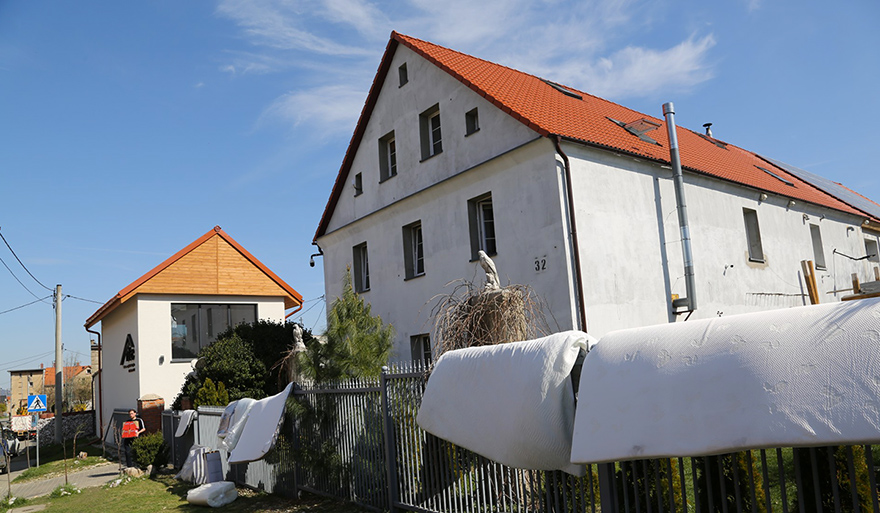
Bielawa (Poland)
In front of the Arte cooperative in Bielawa, a small town in southwestern Poland, there is a constant flow of people on this fine spring day. In front of the entrance, a truck loaded with bandages, medicines and food is waiting to leave for Ukraine. On the left, brand new mattresses are lined up along the fence, catching the eyes of passers-by. These unsaleable items, donated by a large online store, are available for anyone who needs them. Many have been distributed to the Ukrainian refugees who have settled in this town of 30,000 inhabitants. A few people rummage through a cardboard box left on the street, looking for clothing.
Between two mattresses, Emmanuel Kuźmicz, an employee of the Arte cooperative, fills a community fridge. Today there are strawberries, ham and frankfurters – bought at bargain prices from exporters and other food chains, or donated. The fridge is stocked every day and everyone is welcome to help themselves at any time without having to pay anything. "Here, you can find help at any time," says Emmanuel Kuźmicz, who has been working for almost 10 years in this solidarity-oriented cooperative founded in 2012.
Community spirit
Arte employs 30 people in situations of social reintegration, many with addictions. It offers them a place to live, a community and a source of work. Most of its employees work in outdoor services or in the construction industry. Arte benefits from low-interest loans financed by the European Social Fund (ESF).
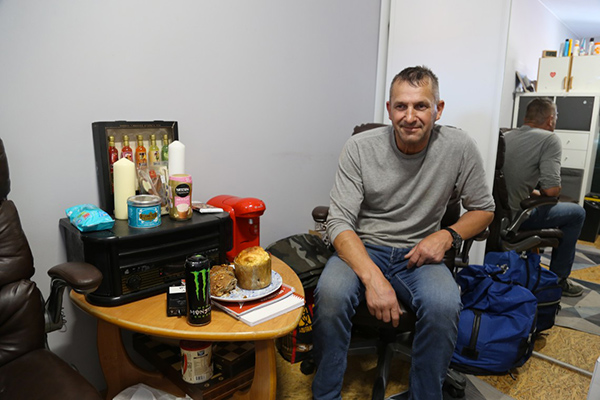
Dressed in a grey sweatshirt and jeans, Emmanuel Kuźmicz is the epitome of the "Arte model". This former miner struggled with alcohol after his wife left him. He then lost his home and suffered health problems. It was his son who brought him to the Arte hostel.
"If it hadn't been for him, I wouldn't have gone there. I had no hope. But at Arte, they trust you." This fifty-something quickly became one of the pillars of the cooperative. Today, he is in charge of all logistical matters within the organisation. But he is also happy to help out on the construction sites. His latest idea? A barbecue area in the garden, which is already up and running.
In the large house built on the site of an old farmhouse and renovated thanks to an ESF-financed loan from the Polish state bank BGK, Emmanuel Kuźmicz is also being creative. In the vaulted cellar, he imagines himself creating a "French-style" dining room for communal meals. He would like to add an "orangery" near the garden.
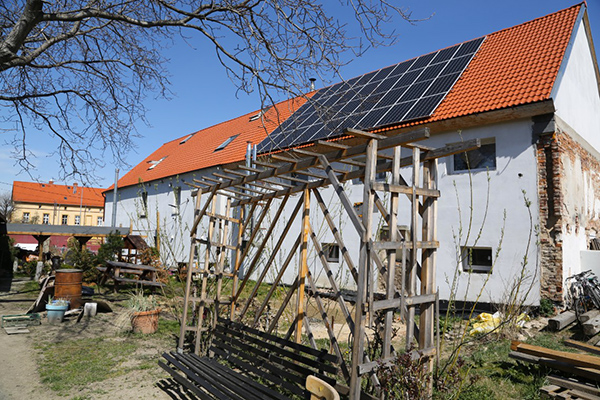
In any case, he and his roommates – he is housed on site – have already worked miracles. "This building was a ruin ten years ago. But we have some great talents in the team." Today, four floors have been tastefully fitted out and solar panels have been installed on the roof, providing energy independence in the summer months. The building itself is to be expanded thanks to a fundraising campaign, and its garden will soon house bungalows for families fleeing domestic violence.
In the upstairs corridor, Arkadiusz Czeszyk is putting away his clean laundry in his room – a neatly arranged dormitory under the roof. "I spent nine years of my life in prison, I got out in 2020," says the blue-eyed 40-year-old, who joined Arte in 2022 and is now employed by the organisation. "I am continuing my therapy to kick the cigarette and alcohol habit. I go to discussion groups and we have psychologists who come every week. I tried it in prison but it never worked. Here, we feel supported and supervised. And faith helps too...", says this Pole who attends a local evangelical church. Many of his fellow believers are also employed by Arte.
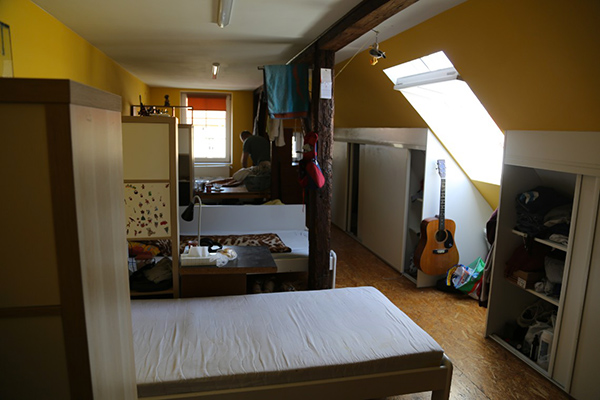
"At Arte, we have former bank managers, soldiers, police officers, Franciscans, ex-convicts convicted of murder... And we all grow together," says Arte director Jarosław Pilecki. He is in the building opposite, a century-old pigsty converted into a plush office. "We also received a loan at a favourable rate from the BGK to renovate this building, where we moved our offices a few months ago," continues this Pole with a salt-and-pepper moustache. "We work with people who have been 'troubled' by life. If we ever had to take out loans on the market, we would have gone bankrupt more than once! We would never have obtained a loan at such an advantageous interest rate, and never have been able to develop as we did", he says, grateful.
A former professional footballer in Lower Silesia, Jarosław Pilecki found himself retired at 40, like many of his colleagues in Bielawa. The town was facing a difficult future as its textile industry had collapsed in the 1990s.
"Many of my friends who had stopped playing football started to become addicted to various drugs at that time. Their lives had suddenly become meaningless," says Jarosław, who still plays football with friends. He found his purpose by getting involved in social work. He ended up creating his own cooperative on a derelict plot. "I saw people I knew drinking... and passing away. I wanted to act, then others joined me and since then we've been learning."
Social and economic fabric
It is people who are marginalised, in the grip of drugs, unemployed, and/or coming out of prison that the fifty-year-old welcomes in his two hostels, which currently house 70 people. "One of the steps in breaking the addiction is to have a job. At Arte, the people we accompany work or learn a trade. When they are still in recovery, they are not very productive. Hence the need for funding during this transitional period, as with the twenty trainees we currently have with us. They are paid thanks to the European Social Fund."
In total, 30 people are employed by Arte, and the cooperative generates a turnover of 2.5 million zlotys (€540,000) per year. "Our employees work for a property management company in Bielawa, mowing the lawn, maintaining the grounds, and so on. Others are engaged in construction, or occasionally in ceramics decoration. We have employees who travel to construction sites as far away as Wrocław [the regional capital, some 60 km distant]."
In all, no fewer than 3,000 people have benefited from Arte's help over the past ten years. "We have a very good relationship with the town council. Some of our employees have also been given municipal flats to renovate and have been living there ever since. We have celebrated some weddings too!" enthuses Jarosław Pilecki.
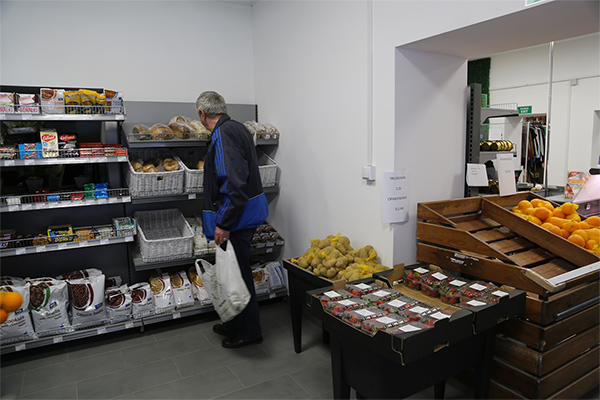
In November 2021, Arte opened a social grocery store, which also benefits from a credit financed by the ESF. "These are additional jobs and it has allowed us to reach out to new groups, such as the elderly, whom we rarely see. And to think that we thought we had already helped quite a lot with Arte!" says Jarosław Pilecki.
In the centre of Bielawa, on the ground floor of a small shopping centre, about a hundred people do their daily shopping. They can find everything – including a second-hand clothing department – and all at rock-bottom prices. This is a godsend for many "Belawians", since inflation is running at more than 10% in Poland.
"The other day, a customer came to buy nappies for her child. Judging by her face, something was wrong. And then we realised that she was homeless," says Anka Pilecka, Jarosław’s sister, who runs the grocery shop. "We immediately contacted Arte, and they were able to find accommodation for the family." She says she would not change her job for anything in the world.
 This article was produced as part of the Union Is Strength competition, organised by Slate.fr with the financial support of the European Union. The article reflects the views of the author and the European Commission cannot be held responsible for its content or use.
This article was produced as part of the Union Is Strength competition, organised by Slate.fr with the financial support of the European Union. The article reflects the views of the author and the European Commission cannot be held responsible for its content or use.